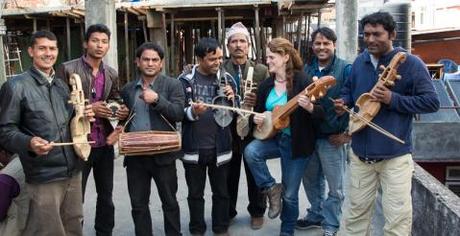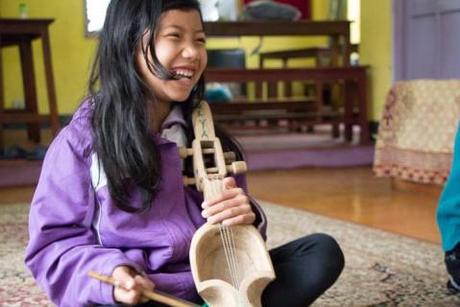
Tara Lindhardt from The Mountain Music Project recently made another trip to Nepal furthering their work helping traditional Nepalese music stay alive. Through developing classes, modern music events, and a documentary film, The Mountain Music Project has made a big difference in keeping this tradition moving on to the next generation of Nepali citizens. In our interview with Tara our readers can get some insight into the work of The Mountain Music Project, their goals, and what to expect from them in the future.
Shyam Nepali invites Bluegrass and Old Time to Nepal to share our music and cultures.
The Whole (S)tory (TWS): For those readers not familiar with The Mountain Music Project, can you give us a brief description of what it is and what their goals are?
Tara Linhardt: The Mountain Music Project’s mission is to encourage the preservation of musical traditions in rural and under-served communities throughout the world, with a special focus on mountainous regions.
Our activities include cultural exchanges and expeditions, multimedia documentation, and supporting local cultural preservation organizations. Our cultural preservation work is done under the umbrella of the Tundra Club, a 501c3 non-profit organization with offices in Montana. Our commercial CDs and DVDs are managed by Mountain Music Project, LLC, registered in Virginia. We are currently working to help musicians preserve their local traditions in Nepal by helping to organize festivals and workshops that celebrate and promote traditional music and traditional instruments. We are also sponsoring sarangi lessons (traditional Nepali music) at 6 different locations in the Kathmandu Valley. These programs are mostly working with orphans who otherwise would not have any music education. The programs help to spread understanding and love for traditional music and help to find good steady work for some of the Gandharba musicians (the musician caste, which was formerly an untouchable caste who are now referred to as Dalit).
The changing world in which they now live with CDs and DVDs and modern media has meant that their previous role as the ones who were always needed to provide live music has changed. By helping organize professional modern style events with them and helping secure teaching positions we can help not only the orphan kids learn the music, but also work to preserve and promote the music for future generations.
TWS: Many people don’t realize the importance of traditional music around the world, how would you describe why it’s an important cultural factor to pass down to future generations?
Tara Linhardt: Just as many people talk about the dangers and sadness of the permanent loss of species in the world today, there is also a crisis at present with loss of cultures, languages, and traditional musics. Once no one is alive who knows how to build or play a certain instrument it becomes extinct. This is happening throughout the globe. Their is so much emphasis in modern media on highly produced, commercial music, that the traditional forms of music often have a very hard time competing and can be permanently lost. The traditional music also carries with it the stories, history, and feelings of a culture. Much like understanding ones history, understanding one’s traditional music can help one understand and discover elements of the culture itself.

TWS: Being of a younger generation I always wonder how to get people interested in traditional music, what are your approaches to making it interesting to a younger population?
Tara Linhardt: I find that if people see how fun it is and how cool it is, they will want to see more and get involved too. Bluegrass and Old Time Music have so many festivals and jam sessions and parties. When people come to their first festival or fiddler’s convention often their mind is blown by how many good musicians are there and by the spontaneous jams and how it has its own subculture. That often gets people hooked. Also seeing a fantastic musician or band can get folks hooked no matter what their age.
TWS: The subject of The Mountain Music Project’s first documentary was the correlation between Traditional American Appalachian music and Traditional music from Nepal, what got you interested in this relationship and how did you come about it?
Tara Linhardt: I went to college for a year in Nepal (my Junior year abroad). It seemed so similar in some ways to rural Virginia, it was really rather funny. Many of the people who travel to Nepal are from cities and suburban areas, but not from the hillbilly south. I then went back with Danny Knicely as a bluegrass musician. We both were fascinated by how the Gandharba musicians were basically playing old-time music and how it sounded so much like our old-time music in Virginia. We met our friend Jake Penchansky in Lhasa, Tibet while on that trip and told him how similar the two musics and places are. He has traveled around the world recording traditional music for radio and archiving purposes. He suggested that we might be able to get a grant and make a film about it. So he eventually succeeded in getting us a small start-up grant just to get us going. Then we went back and met up with two professional videographers back in Nepal (they came from Delhi, India) and started shooting the film and then made a collaborative CD project through the wonders of multi-tracking on a mac laptop. We contacted some well-known professional musician friends back home who volunteered to add tracks to the project and really made a beautiful CD. People like Tim O’Brien, Tony Trischka, Mark Schatz, Curtis Burch, Abigail Washburn, Riley Baugus and more added their music and it became a really special project.
TWS: Does The Mountain Music Project have any plans of doing more documentaries featuring different countries other than Nepal? Will your focus remain on the similarities between Traditional American Music and that of other countries or will the focus ever shift to two foreign countries and comparing their traditional music?
Tara Linhardt: I am open to ideas and love to travel and love to meet people and play all sorts of traditional music. So we will see, but I would love to try all sorts of things in the future.
TWS: The past few years the people involved in The Mountain Music Project film has been traveling around hosting screenings and performances, how can our readers schedule an event in their town?
Tara Linhardt: They can always check out our website and email us through the contact link there.
Check out The Mountain Music Project’s website for more information on how to get a copy of the documentary or how to schedule a concert/viewing event in your area.

